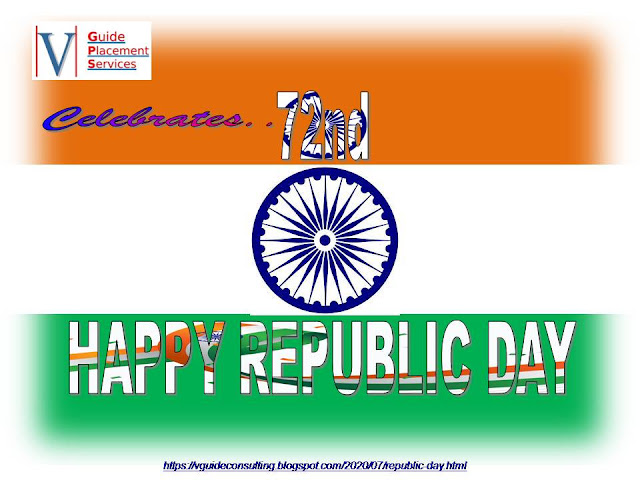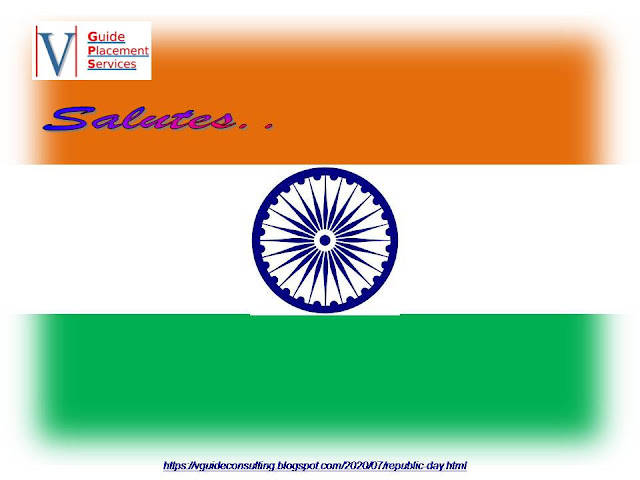TRI COLOUR- OUR PRIDE
|
|||
SAFFRON
|
WHITE
|
DHARMA /ASHOKA CHAKRA
|
GREEN
|
Colour of ‘Strength & Courage’ of the Country
|
The Colour of ‘Peace & Truth’
|
‘Wheel of the Law’
|
Colour of ‘Fertility, Growth & Auspiciousness’ of the
Country
|
What is ‘Republic Day’:
Republic
Day is a national occasion in India. It praises the date on which the
Constitution of India happened on 26 January 1950 supplanting the Government of
India Act (1935) as the overseeing report of India and subsequently,
transforming the country into a recently framed republic.
The
Constitution was received by the Indian Constituent Assembly on 26 November
1949 and became effective on 26 January 1950 with a popularity based government
framework, finishing the nation's progress towards turning into a free
republic. 26 January was picked as the date for Republic day since it was on
this day in 1929 when the Declaration of Indian Independence (Purna Swaraj) was
announced by the Indian National Congress instead of the Dominion status
offered by the British Regime.
History of‘Republic Day’:
India accomplished
autonomy from British Raj on 15 August 1947 after the Indian freedom
development. The autonomy got through the Indian Independence Act 1947 (10 and
11 Geo 6 c 30), an Act of the Parliament of the United Kingdom that parceled
British India into the two new free Dominions of the British Commonwealth
(later Commonwealth of Nations).[2] India acquired its autonomy on 15 August
1947 as a protected government with George VI as head of state and the Earl
Mountbatten as representative general. The nation, however, didn't yet have a
changeless constitution; rather its laws depended on the altered frontier
Government of India Act 1935. On 29 August 1947, a goal was moved for the
arrangement of Drafting Committee, which was named to draft a changeless
constitution, with Dr B R Ambedkar as director. While India's Independence Day praises its
opportunity from British Rule, the Republic Day commends the coming into power
of its constitution. A draft constitution was set up by the board of trustees
and submitted to the Constituent Assembly on 4 November 1947. The Assembly met,
in meetings open to open, for 166 days, spread over a time of two years, 11
months and 18 days before receiving the Constitution. After numerous thoughts
and a few adjustments, the 308 individuals from the Assembly marked two written
by hand duplicates of the record (one each in Hindi and English) on 24 January
1950. After two days which was on 26 January 1950, it happened all through the
entire country. On that day, Dr. Rajendra Prasad's started his first term of office as President of
the Indian Union. The Constituent Assembly turned into the Parliament of India
under the transitional arrangements of the new Constitution.
Celebrations of ‘Republic Day’:
The
primary Republic Day festivity is held in the national capital, New Delhi, at
the Rajpath before the President of India. On this day, ceremonious
processions occur at the Rajpath, which are proceeded as a tribute to India; its solidarity
in assorted variety and rich social legacy.
‘Award Distribution’ Ceremony:
Just
before Republic Day, the President of India circulates Padma Awards
to the regular people of India consistently. These are the second most elevated
regular citizen grants in India after Bharat Ratna. These
honors are given in three classifications, viz. Padma Vibhushan, Padma Bhushan and Padma Shri, in
diminishing request of significance.
• Padma Vibhushan for
"uncommon and recognized help". Padma Vibhushan is the
second-most noteworthy non military personnel grant in India.
• Padma Bhushan for
"recognized assistance of a high request". Padma Bhushan is the
third-most noteworthy non military personnel grant in India .
• Padma Shri for
"recognized assistance". Padma Shri is the
fourth-most noteworthy regular citizen grant in India.
While
being national distinctions, the Padma grants
do exclude money remittances, advantages, or extraordinary concessions in
rail/air travel.[10] Per a December 1995 judgment of the Supreme Court of
India, no titles or honorifics are related with the Bharat Ratna or any
of the Padma grants; Honorees can't utilize them or their initials as
additions, prefixes or pre-and present nominals
connected on the awardee's name. This remembers any such use for
letterheads, greeting cards, banners, books and so forth. On account of any
abuse, the awardee will relinquish the honor, and the person in question will
be advised against any such abuse after accepting the respect.
The
design contains a sanad (Certificate) gave under the hand and seal of the President
and a Medallion. The beneficiaries are additionally given an imitation of the
emblem, which they can wear during any stylized/State capacities and so on., on
the off chance that they want. A memorial pamphlet giving out brief subtleties
in regard of each grant champ is additionally discharged upon the arrival of
the instatement service.
‘Beating Retreat’ Ceremony:
The
Beating Retreat Ceremony is held after formally signifying the finish of
Republic Day merriments. It is directed on the night of 29 January, the third
after a long time after the Republic Day. It is performed by the groups of the
three wings of the military, the Indian Army, Indian Navy and Indian Air Force.
The scene is Raisina Hill and a contiguous square, Vijay Chowk,
flanked by the North and South square of the Rashtrapati Bhavan
(President's Palace) towards the finish of Rajpath.
The
Chief Guest of the capacity is the President of India who shows up accompanied
by the (PBG), a mounted force unit. At the point when the President shows up,
the PBG administrator requests that the unit give the National Salute, which is
trailed by the playing of the Indian National Anthem, Jana Gana Mana, by the
Army. The Army builds up the function of show by the massed groups in which
Military Bands, Pipe and Drum Bands, Buglers and Trumpeters from different Army
Regiments other than groups from the Navy and Air Force participate which play
well known tunes like Abide With Me, Mahatma Gandhi's preferred song, and Saare Jahan Se Achcha toward
the end.







0 Comments